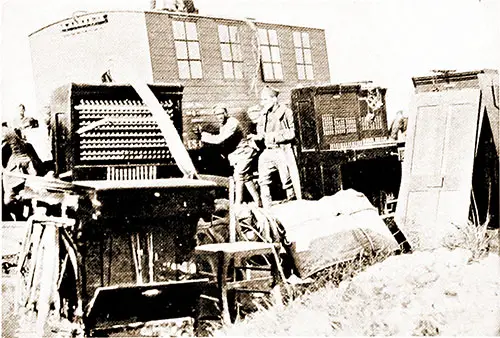Signal Corps Girls Brave Dangers - 1919

Save the Pieces Scene during the Fire Which Broke out at First Army Headquarters, Souilly, France, October 30, 1918. Circuits of Victory, 1921. Official US Army Photograph. GGA Image ID # 19a22947dc
It is a fact that all during the great war, the women telephone operators of the Signal Corps have played an enviable part, not even surpassed by the work of the nurses, for in many cases, their units were located only twelve miles behind the firing line and were subjected to all the dangers of those within range of the sweeping Teuton guns.
These girls were under the same military rule as the Sammies in the trenches. They had to have passes galore and had to report to their superior officer, the chief operator. Discipline regulated their comings-in and their goings-out, and in reward for their service, they wore the symbols of the trust of a nation on their collars—the letters "U. S."
It is interesting to know that the work of housing these units was also entrusted officially to women. The government asked the Young Women's Christian Association, prepared for such service by its equipment, personnel, and fifty-two years of experience in housing women, to look after the physical welfare of every unit which arrived in France.
This was successfully achieved in every instance, though the difficulties of obtaining lodgings, servants, and rations in headquarters towns were almost impossible, and the fearful cost of bare necessities made it a real problem to keep expenses down within reach of the women, who shared all expenses of the house on the cooperative basis.
The $15 per week, which is usually averaged to live, was considered an achievement of genius by the interested army men, who had had to pay as much as $7 for a single dinner in Paris.
The houses were almost always attractive old French establishments, sometimes with the quaintest of gardens and the most enchanting shrubbery. Even the officers flocked to the side of the grate-fire and absorbed the undeniable air of American "hominess." Again, the place was only a set of rooms, but the unit's home was the best obtainable whatever its nature.
In many cases, it was better than the officers stationed in a town declared possible to obtain, as in one village very near the front, just before the last big drive, where the YWCA secretary in charge of the unit to be moved there, got hold of a splendid house, a feat which had been proclaimed impossible.
Incidentally, this particular finding of lodgings made it possible to have the unit close to the action. It put through such perfect connections that a good share of the success of the great drive is credited to these women telephone operators.
The first work of the YWCA with the Signal Corps came about by accident. In its hurry and rush of detail, the government had been unable to procure housing facilities for the first unit to go abroad, which did not know when it was to embark, and so could not get lodgings as scattered individuals.
The girls were to be housed in warehouses on the docks at Hoboken while waiting to sail—an uncomfortable arrangement. Miss Vera Schaefer, of the Industrial Department of the Young Women's Christian Association, who had many telephone girls in her club work, heard of this condition and received permission to bring the unit to the YWCA's National Training School, where it provided cots and cleanliness and food, at any rate.
When this same unit was due to arrive in France, the officers in charge of billeting it came in desperation to the Hotel Petrograd, the YWCA Hostess House, in Paris to have the girls taken care of there.
As a result of its pick-measure assistance, the government decided that women were the best providers for the needs of women, and the YWCA were evidently the most efficient providers on the list of women-who-would-do.
“Girls Brave Dangers,” in Bell Telephone News, Detroit Edition, Vol. 8, No. 9, April 1919, p. 14.
